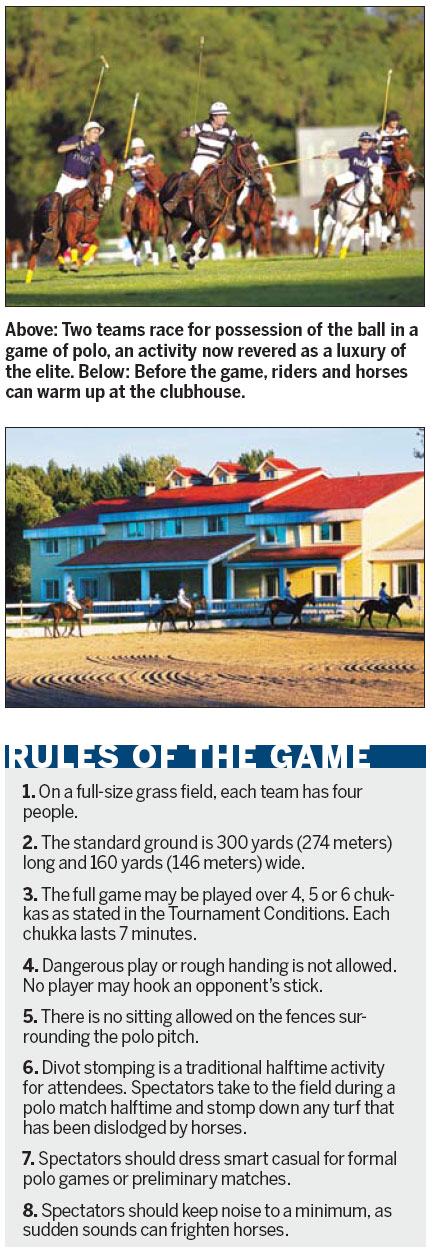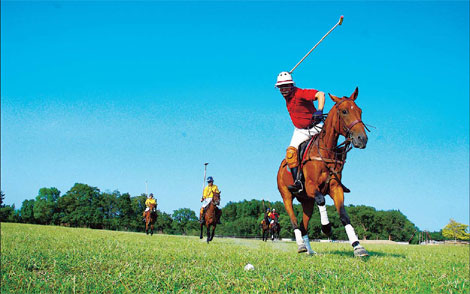Life
Fans gallop to polo clubs
By Wang Ru (China Daily)
Updated: 2010-12-21 08:10
 |
Large Medium Small |
|
A rider prepares to strike a polo ball under a bright blue sky. Photos provided to China Daily |
The "sport of kings", popular in China more than 1,000 years ago, is making a comeback as the game of the newly rich. Wang Ru reports
As the excited voice of a commentator with a marked British accent floats over the air, eight horseback riders in helmets, pants and boots, swing their mallets at a white ball on a verdant field ringed by mountains.
They charge after the ball like cavalrymen in battle but are all smiles and handshakes once the game ends.
This is the scene at Beijing Sunny Time Polo Club, founded in 2004, located close to the Badaling Great Wall in the capital's northern suburb.
Polo, called the gentleman's game, has had a long history in the English countryside, and is now making a comeback in China.
Most people believe polo originated in Persian cavalry units, usually the king's guards or special troops, where it was part of their training in the 5th century BC or earlier.
In China, polo appeared during the Han Dynasty (206 BC-AD 220), at the beginning of the third century AD, reaching its peak in the Tang Dynasty (AD 618-907). Modern-day polo is a legacy of the British, whose colonial troops introduced the game from India to Britain in the early- to mid-19th century.
For most Chinese today, polo is like a prestige brand - exotic and beyond reach. But Xia Yang, founder and owner of Beijing Sunny Time, says he wants to make this sport, most often associated with the elite, a mass one in China.
To this end, the club's horses come for 300 yuan ($45) per hour of riding and polo practice. The playing fee is 400 yuan for every seven-minute session or chukka. A game often comprises 4 chukkas. Annual membership, whose fees vary between 50,000 yuan and 150,000 yuan, gives members unlimited playing time.
According to Xia, "Many middle-class Chinese can afford this."
The 30-odd members of his club are mostly entrepreneurs, retired government officials and foreigners. Some foreign companies in Beijing also sometimes engage Xia's club for their employees.
In 1996, Xia, an architect and successful property developer found himself grappling with health problems caused by obesity.
Desperate for exercise that would help him lose weight fast, he took to horse riding. Over two months, he lost 5 kg. Xia then began to undergo professional training from coaches of the national team.
In 1998, he traveled across China to hunt for pedigree racehorses and spent millions on gathering the finest bloodstocks. Obsessed with his horses, Xia even lived with them and hired experts from abroad to oversee their nutritional needs.
Xia's horses won him many awards but in 2004, the Chinese mainland banned horse racing. Xia was forced to look for other options for his expensive stocks. Television footage of a polo game played in 1996 between Britain's Prince Charles and the Sultan of Brunei caught his attention.
"The game combines perfectly the excitement of a horse race and the competitiveness of a team sport. It is, moreover, a gentleman's game, requiring players to adhere strictly to the rules and playing etiquette," says Xia, who plays polo every week.
When he established Beijing Sunny Time in 2004, he traveled to Argentina, Chile and the US to learn all about managing polo clubs and the best breeds of polo ponies. To popularize the sport, he organized invitational games that attracted top players from overseas clubs.
As executive director of the Polo Commission of the Chinese Equestrian Association, Xia is looking forward to seeing polo back in the Olympics.
The game's growing popularity in China owes much to Xia's efforts. While Beijing already has three polo clubs, in 2007, the Nine-Dragon Hill Polo Club opened in Zhejiang province. It is also reported that the United States Polo Association has plans to establish a polo club in Shanghai.
In November, a high-end polo club owned by a Hong Kong property developer opened in Tianjin. Promoted as an "individual experience of luxury", the Tianjin Goldin Metropolitan Polo Club, developed by Hong Kong Goldin Properties Holdings Limited, is part of the company's commercial and residential property project. The annual membership fee ranges from 380,000 yuan ($57,100) to 10 million yuan ($1.5 million), available only by invitation.
The club has two elegant international-standard lush green polo fields spanning 300 by 160 yards (274 by 146 meters). Occupying 898,000 square meters, the club includes training facilities, world-class stables, a theme park and a luxury hotel. Housed inside the club's stables are 60 Australian bloodstocks.
Xia, who plans to build a hotel as part of his club to attract more urban people, sees polo becoming as popular as golf and skiing in China.
Every weekend, Zhang Yong, 56, a retired government official, drives his wife and son to the Sunny Time Polo Club.
Two years ago, Zhang and his wife, both horse lovers, gave up buying the family's dream SUV, to instead spend 250,000 yuan on a pony with the blood of the rare Ferghana horse that is native to Central Asia.
The family has a courtyard house in the suburbs, where they can keep their horse, along with their many dogs. But they prefer to keep him at the club to share the excitement of playing polo with the other members.
"Polo is an exciting and addictive game. Few other activities can beat the feeling of riding and competing at the same time," Zhang says. "You need to love your horse and treat him well. Good communication with the horse is key in a polo game.
"The game provides a chance to meet people from a similar social background. Playing polo helps forge close friendships. The club members also share business information or even become partners."
Zhang pays 2,500 yuan every month to the club for the upkeep of his pony. Recently, the family ordered polo equipment worth 20,000 yuan. Monte James, an art agent and exhibition consultant from the United States, joined the Beijing Sunny Time club in 2009 and plays twice a week.
James, 58, who played professional polo in the US, never expected to find a good club in Beijing when he arrived in 2003.
"Polo is not a mass game in the US. But many successful people loved playing polo such as Walt Disney, who only quit when faced with the risk of grave injury. You can feel the charm of the sport only when you play it.
"I met some Americans who used to play professional polo in the US. It is interesting that we didn't know each other back home, but have become connected by polo in Beijing."
Although James has suffered his share of falls, he says, "When I play polo, the concentration and joy make me forget all the troubles in my life".
He adds: "Polo is also traditionally closely associated will charity. I hope it will benefit charity in China in future."

